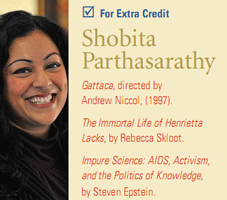Even before we had mapped the human genome, American entrepreneurs had begun to stake claims to it. Over the last two decades, the U.S. Patent Office has issued more than 5,000 patents on parts of the human genome, leaving an alarming 20 percent of our genes under the ownership of corporations, individuals, and universities. While some argue that this practice gives patent holders an incentive to pour money into research and develop genetic risk tests and disease interventions, many others, including Ford School assistant professor Shobita Parthasarathy, argue that patent ownership stifles innovation, decreases consumer options, and makes health care prohibitively expensive.
 |
|
Shobita Parthasarathy |
In fall 2009, a coalition of patients, scientists, and physicians coordinated by the ACLU filed suit against Myriad Genetics and the U.S. Patent Office to challenge patents on the genes that indicate increased risk for breast and ovarian cancer. The case was more than a challenge to one company's patents, however: it called into question whether human genes should be patented at all.
In the case of breast and ovarian cancer genetics, says Parthasarathy, who co-directs the University's Science, Technology, and Public Policy program, Myriad Genetics' patent monopoly has led to inaccurate and prohibitively expensive genetic risk tests. She explored these issues and others in her MIT Press book, Building Genetic Medicine: Breast Cancer, Technology, and the Comparative Politics of Health Care, which analyzes the history and politics of genetic testing for breast and ovarian cancer in the United States and Britain.
Based on the findings in her book, the ACLU asked Parthasarathy to work with them as they developed the lawsuit. She helped identify the list of plaintiffs in the suit; submitted an expert declaration in support of the ACLU position; and spoke to media representatives, including participating in an hour-long panel discussion at Washington, DC's National Public Radio station, WAMU, about the implications.
This spring, Judge Robert Sweet, the New York Federal Court Judge who presided over the case, cited Parthasarathy's declaration extensively in his landmark ruling against Myriad. Myriad's appeal on the ruling will be heard in the Federal Court of Appeals in DC. Regardless of the ruling by the appeals court, however, Parthasarathy notes that the final decision will likely come from the U.S. Supreme Court. "The case has such tremendous potential for transforming not only the patent system, but also the cultures of scientific research and health care in the United States," Parthasarathy says. "The Supreme Court will certainly want to weigh in."
Below is a formatted version of this article from State & Hill, the magazine of the Ford School. View the entire Fall 2010 State & Hill here.